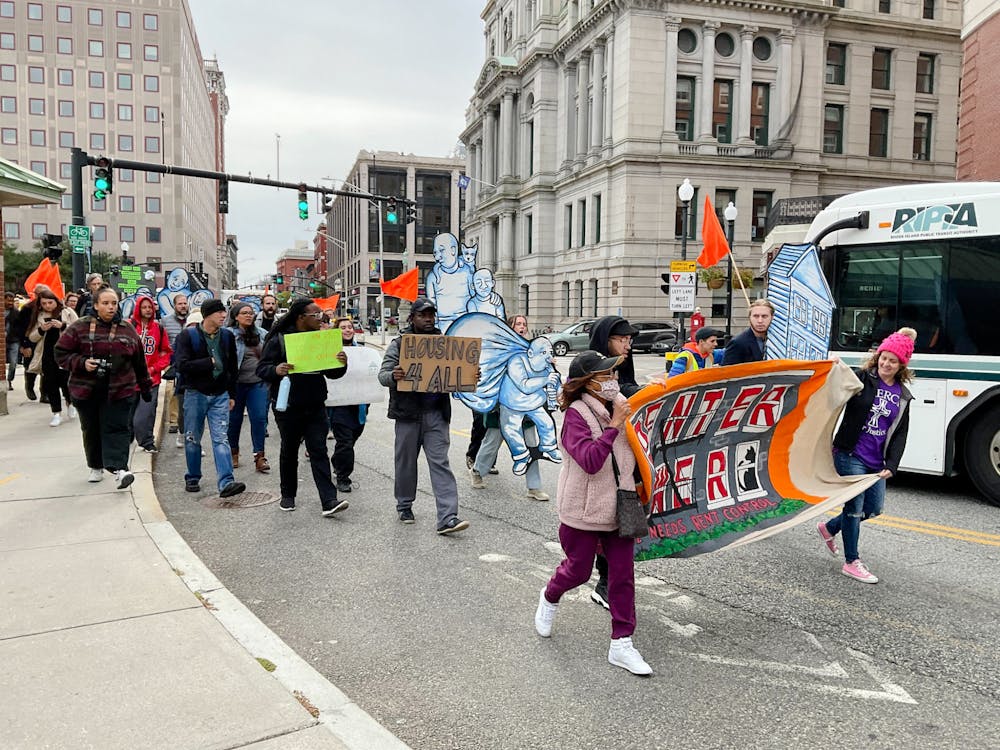Roughly 50 protestors called on Gov. Daniel McKee and Secretary of Housing Josh Saal ’09 to declare a state of emergency and increase housing units for homeless Rhode Islanders at a march from Burnside Park to the Rhode Island State House Monday morning.
According to an announcement of the march posted to Housing Opportunities for People Everywhere’s Instagram page last Tuesday, the organizers of the march had three demands for McKee and Saal: to declare a state of emergency for homelessness in Rhode Island, provide $12.2 million for 380 shelter beds and provide $2.8 million to prevent 420 additional households from becoming homeless.
The protest was organized by the Rhode Island Homeless Advocacy Project and Providence Direct Action for Rights and Equality. The event followed two meetings between state officials — including McKee and Saal — and housing service providers over the last two weeks.
A press release from the Office of the Governor published Friday stated that McKee and the Department of Housing awarded $3.5 million to six Rhode Island-based organizations and projects with plans to create a total of 231 additional shelter beds.
RIHAP Member and Professor of Sociology at Providence College Eric Hirsch, who attended the meetings, said funding housing projects is not enough.
Hirsch told The Herald that the focus of this protest was to advocate for the deployment of the shelters themselves, not just the funding needed to create them.
“We need the beds, not just the funding,” Hirsch said. “So we’re putting pressure on them.”
Hirsch said that governmental hesitation to build shelters is a “not in my backyard” problem in which “towns and cities don’t want to put up any kind of shelter beds within their communities.” He said he believes that McKee especially “didn’t want to push that in an election year.”
According to HOPE Outreach Coordinator Patrick Rhatigan ’23, finding sites to build additional shelters is the largest roadblock to increasing shelter capacity.
Currently, zoning laws restrict the construction of new shelters, Rhatigan said. By declaring a state of emergency, McKee could allow construction of shelters to bypass zoning regulations.
Rhatigan added that declaring a state of emergency in RI regarding homelessness would “make (the issue) a priority” and “recognize that it is an emergency right now.”
The nearly 50 attendees were a mix of Rhode Island residents and students.
Isabella Tolscos, an RI resident, told The Herald that she attended the march because of her own experiences with homelessness. Tolscos said she walks three miles daily to potential housing appointments, but still has not been able to find a shelter.
Rhode Island Medical Navigator General Manager Ana Malfa ’21 MD’25, whose organization partners medical students with homeless residents for health-related support, said she attended in order to be involved with housing justice at both a policy and individual level.
Hirsch said that more governmental action is urgently needed, especially given the changing weather.
“It’s getting cold,” he said. “I'm concerned about getting enough beds in time before we get freezing weather. That's the big problem.”

Neil Mehta was the editor-in-chief and president of the Brown Daily Herald's 134th editorial board. They study public health and statistics at Brown. Outside the office, you can find Neil baking and playing Tetris.





